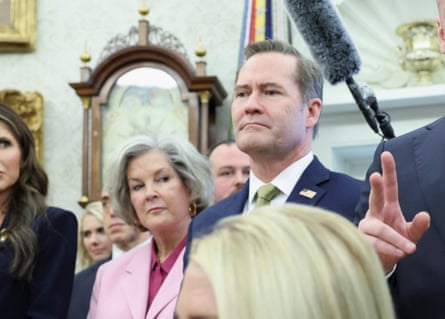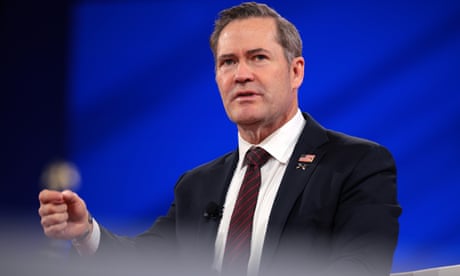The move comes after Waltz lost officials’ confidence, sources say, with Marco Rubio to take on the national security job
Donald Trump’s national security adviser, Mike Waltz, and his deputy, Alex Wong, will be leaving their posts after they lost the confidence of other administration officials and found themselves without allies at the White House, according to two people familiar with the matter.
The exit of Waltz and Wong marked the conclusion of a fraught tenure. In March, Waltz inadvertently added Jeffrey Goldberg, editor-in-chief of the Atlantic, to a Signal group chat that shared sensitive information about US missile strikes in Yemen before they took place.
Trump announced in a Truth Social post later on Thursday that he would name his secretary of state, Marco Rubio, to also take on the job of the national security adviser on an interim basis, and that he would nominate Waltz to be the US ambassador to the United Nations.
The president briefly considered firing Waltz over the Signal episode, but decided he did not want the media to claim the ouster of a cabinet official weeks into his second term. Trump was also mollified by an internal review that found Waltz mistakenly saved the Atlantic editor’s number.
The furore over the Signal group chat, if anything, was widely seen to have bought Waltz and Wong additional time after they had both been on shaky ground for weeks. That was in large part because of a strained working relationship with Trump’s chief of staff, Susie Wiles, and other top officials.
The interpersonal difficulties extended to Wong, according to a person directly familiar with the ousters. Wong frustrated some officials at other agencies who were involved in national security matters and complained to people in the West Wing that Waltz refused to rein him in, the person said.
In the days after the Signal group chat episode, Waltz sought advice from JD Vance and others in the vice-president’s circle about how to reset relations. Vance counseled Waltz to be more deferential to Wiles, who had pushed for him to get the job, and throw around his weight less.
But Waltz also came under fire from other quarters. Even though he was cleared in the internal review into Signalgate, as it came to be known, Waltz faced pressure for being seen as a war hawk and at odds with Trump’s “America first” agenda.
That included scrutiny at a dinner that Waltz attended with Trump and some of Trump’s allies including Tucker Carlson, who has been skeptical of the adviser. The outside pressure campaign to remove Waltz additionally included an effort led by Steve Bannon, the people said.
And the far-right activist Laura Loomer, who pushed a conspiracy theory that Wong had loyalties to China, weakened Waltz’s power after she went to the White House last month at Trump’s invitation and successfully pushed for Trump to fire a number of Waltz’s staffers.
The gutting of Waltz’s staff was widely seen to have weakened his position inside Trump’s orbit. As Carlson, Bannon and Loomer separately pushed a whisper campaign that Waltz would be out before June, officials in the White House concurred that Waltz’s influence was waning.
This week, it was quietly made clear to Waltz and Wong that their time at the national security council would be coming to an end. Waltz tried to extend his tenure by attending a cabinet meeting on Wednesday but was informed of his removal on Thursday, one of the people said.
The removal of Waltz was so abrupt that it only became clear to many in the White House on Thursday morning. Waltz appeared to sense something was going on before he appeared on Fox News in the morning, but he did not know that he was being pushed out, a person familiar with the matter said.
With Waltz departing just months into the job – having left behind a safe seat in Congress – the national security council has been left without an overarching strategy. Ordinarily, the national security adviser develops a strategy by hashing out plans with other agencies over months.
The US strategy for some major foreign national security issues, including how to engage with China on thorny issues such as its posture towards Taiwan, its priorities in the Indo-Pacific region and adversarial military plans against allies, remains a work in progress.
And with the Russia-Ukraine conflict, Waltz had pressed Trump to hit Russian Vladimir Putin with deep, punitive sanctions if he failed to agree to a peace deal being brokered by Trump’s special envoy, Steve Witkoff. That sort of moderate recommendation in policy discussions may also be gone with Waltz’s removal.
The top Senate Democrat, Chuck Schumer, welcomed the firing but said that the defense secretary, Pete Hegseth, was most deserving of losing his job.
“They should fire him, but they’re firing the wrong guy. They should be firing Hegseth,” the minority leader told reporters at the Capitol.
He accused Republicans of confirming a defense secretary who was unfit for the job, and predicted scandals similar to Signalgate – where Hegseth, Waltz and other national security officials shared details of airstrikes in Yemen in a group chat – would happen in the future.
“They fired the [national security council] guy, but there are going to be many more problems, just like Signalgate that come out of the defense department, as long as Hegseth is in charge. This is not a one-off. This is going to happen over and over and over again.”
Trump’s move to name Rubio the interim national security adviser took officials at the state department by surprise. Tammy Bruce, the spokesperson for the state department, appeared to learn about the decision from a reporter during a news conference in real time.
The appointment means Rubio has taken on a total of four positions in the administration. In addition to being secretary of state and interim national security adviser, he is also currently serving as the acting USAID administrator and the acting national archivist.
Source: The Guardian




Recent Comments